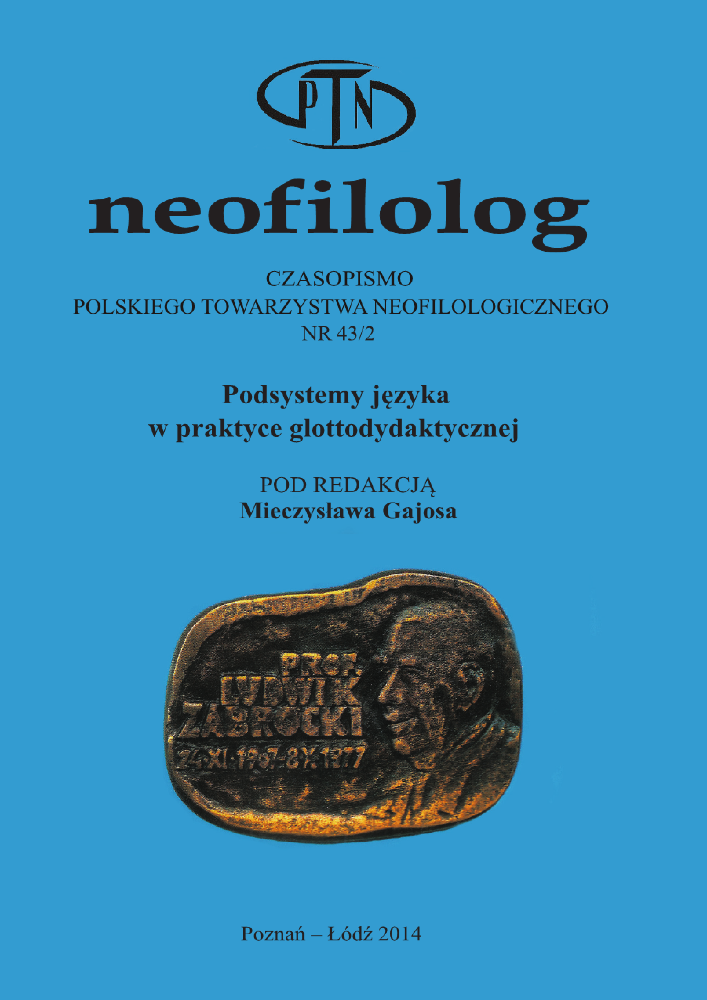Abstract
This report presents the results of a study into the relationship between musical ability and the development of a phonological system by foreign language learners. Our own experiences both as a foreign language teacher and as a musical group leader have raised a number of questions and lines of enquiry. These challenge previous researchers’ findings concerning the allegedly absolutely positive effect of music on language learning and as a result this study has been undertaken.After a brief theoretical presentation, we describe the research project in which learners abilities to distinguish and produce different phonemes as well as the prosody of the language studying are analyzed. Two groups of learners were compared in this study. One group attended a music school. The second group had no musical experience. The study showed that receptive skills were not significantly different between the two groups. The group of learners with musical training was more articulate but this was the only difference. The statistical approach used in analysis of data was the Wilcoxon test.
References
Abry, D., Chalaron, M.L. 1994. Phonétique 350 exercices. Paris : Hachette.
Bencivelli, S. 2009. Pourquoi aime-t-on la musique? Oreille, émotion, évolution. Paris: Belin, Collection Pour La Science.
Chodkowski, A. (red.).1995. Encyklopedia muzyki. Warszawa: Wydawnictwo Naukowe PWN.
Fomina, A. 2000. «Song Melody Influence on Speech Intonation Memorization». (w) Woods, C., Luck, G.B., Brochard, R., O'Neill, S. A., i Sloboda, J. A. (red.). Proceedings of the Sixth International Conference on Music Perception and Cognition. Keele, Staffordshire, UK: Department of Psychology. http://www.escom.org/proceedings/ICMPC2000/Sun/Fomina.htm DW 13.04.2014.
Fonseca-Mora, M.-C., Toscano-Fuentes, C. i Wermke, K. 2010. «Melodies that help: The Relation between Language Aptitude and Musical Intelligence». Anglistik International Journal of English Study vol. 22(1): 101-118. http://files.eric.ed.gov/fulltext/ED518583.pdf DW 24.04.2014.
Gajos, M. 2010. Podsystemy języka w praktyce glottodydaktycznej. Fonetyka. Łódź: Wydawnictwo Uniwersytetu Łódzkiego.
Groeger, L. 2011. «Exploring the Musical Brain at the Society for Neuroscience Annual Meeting». Scientific American November 15. www.scientificamerican.com DW 9.02.2014.
Kania, J.T. 1982. Szkice logopedyczne. Warszawa: WSiP.
Klimczak-Waniek, E. 2009, «Badanie wymowy w języku obcym - od teorii do praktyki». Neofilolog 32: 19-33.
Ludke, K. 2008. Teaching foreign languages through songs (workbook), University of Edinburgh: Institute for music in human and social development. https://www.academia.edu/978951/Teaching_foreign_languages_through_songs_workbook_ DW 15.04.2014.
Medina, S.L. 1990. «The effect of music on second language vocabulary acquisition». National network for Early Language learning 6 (3): 1-26. http://www.oocities.org/ESLmusic/articles/article01.html DW 15.04.2014.
Murphy, T. 1990. «The song stuck in my head phenomenon: A melodic Din in the Lad». System vol. 18 (1): 53-64.
Sawa, B. 1984. «Percepcja słuchowa a normalny i zaburzony rozwój mowy». Psychologia wychowawcza 5: 575-586.
Siek-Piskozub, T. i Wach, A. 2006. Muzyka i słowa. Rola piosenki w procesie przyswajania języka obcego. Poznań: Wydawnictwo Naukowe UAM.
Wilczyńska, W i Michońska-Stadnik, A. 2010. Metodologia badań w glottodydaktyce. Wprowadzenie. Kraków: Avalon.
Zedda, P. 2006. «La langue chantée: un outil efficace pour l’apprentissage et la correction phonétique». Les Cahiers de l’Acedle 2 http://acedle.org/IMG/pdf/P-Zedda_cah2.pdf DW: 05.04.2014.
License
Copyright (c) 2019 Neofilolog

This work is licensed under a Creative Commons Attribution-NoDerivatives 4.0 International License.
Authors
Authors of texts accepted for publication in Neofilolog are required to complete, sign and return to the Editorial team’s office the Agreement for granting a royalty-free license to works with a commitment to grant a CC sub-license.
Under the agreement, the authors of the texts published in Neofilolog grant Adam Mickiewicz University in Poznań a non-exclusive, royalty-free license and authorize the use of Attribution-NoDerivatives 4.0 International (CC BY-ND 4.0) Creative Commons sub-license.
The authors retain the right to the free disposal of the work.
Users
Interested Internet users are entitled to use works that have been published in Neofilolog since 2017, under the following conditions:
▪ attribution – obligation to provide, together with the distributed work, information about the authorship, title, source (link to the original work, DOI) and the license itself.
▪ no derivatives – the work must be preserved in its original form. Without the author's consent, it is not possible to distribute the modified work in the form of translations, publications, etc.
Copyrights are reserved for all texts published since 2017.
Miscellaneous
Adam Mickiewicz University in Poznań retains the property right as a whole (layout, graphic form, title, cover design, logo etc.).
